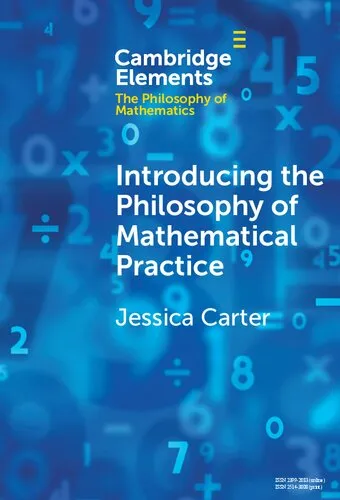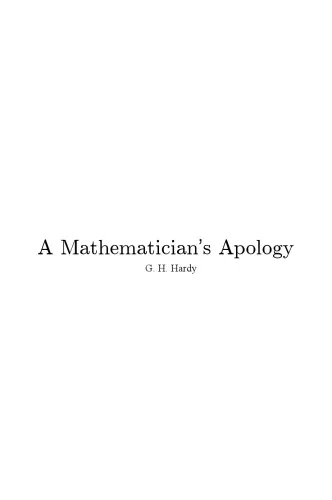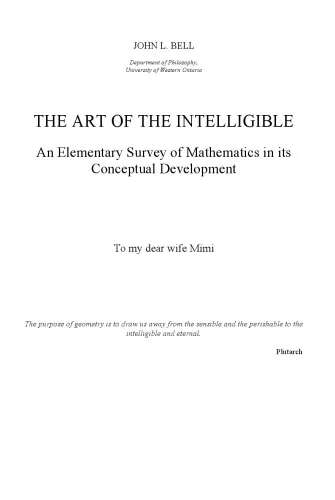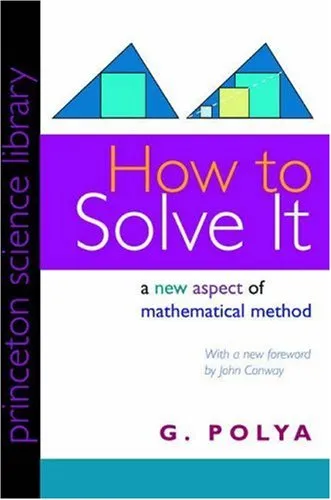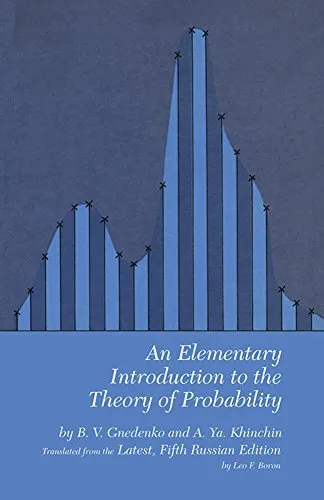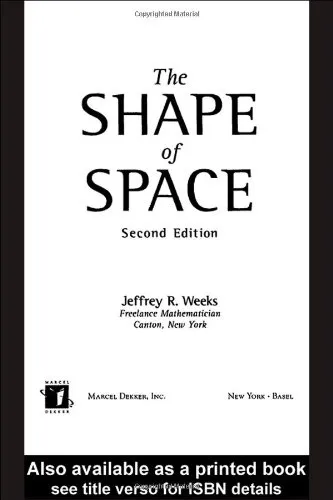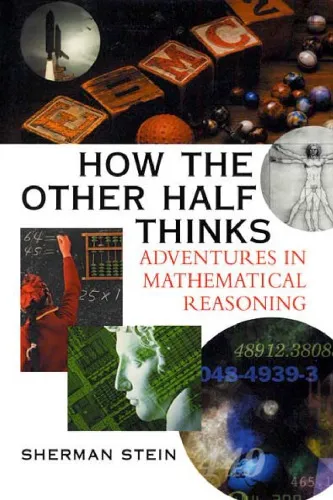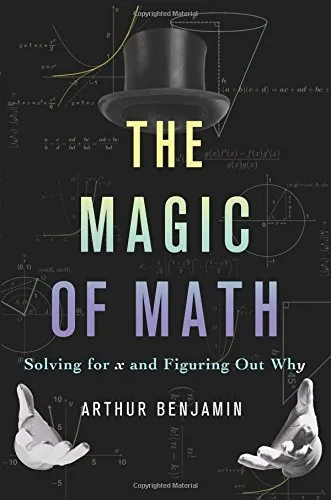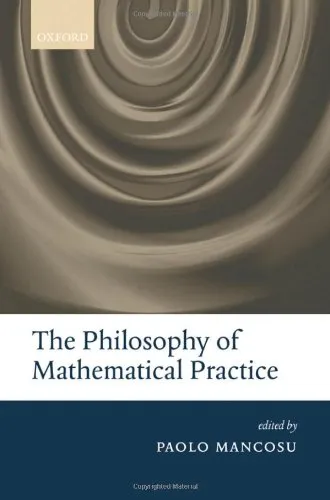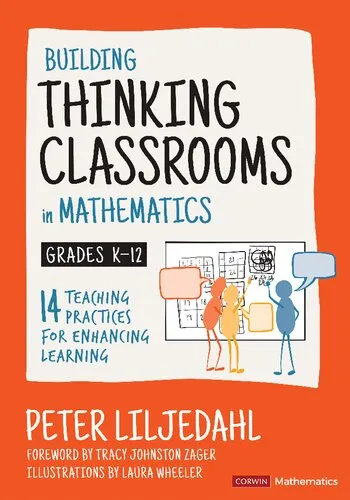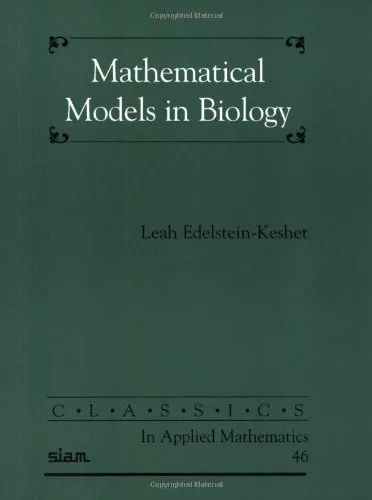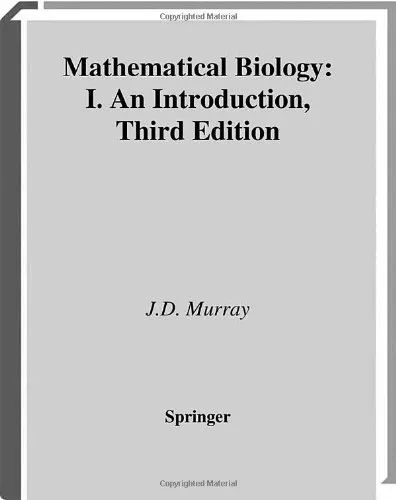Introducing the Philosophy of Mathematical Practice
4.0
بر اساس نظر کاربران

شما میتونید سوالاتتون در باره کتاب رو از هوش مصنوعیش بعد از ورود بپرسید
هر دانلود یا پرسش از هوش مصنوعی 2 امتیاز لازم دارد، برای بدست آوردن امتیاز رایگان، به صفحه ی راهنمای امتیازات سر بزنید و یک سری کار ارزشمند انجام بدینکتاب های مرتبط:
معرفی کتاب "Introducing the Philosophy of Mathematical Practice"
کتاب "Introducing the Philosophy of Mathematical Practice" یکی از منابع نوآورانه و بینرشتهای است که به تاثیرات فلسفی و عملی ریاضیات در دنیای مدرن میپردازد. این اثر توسط جِسیکا کارتر نگاشته شده و تلاش میکند تا به جای تمرکز روی سوالات کلاسیک فلسفه ریاضیات، بر بررسی عملی و فرایندهای انجام ریاضیات تمرکز کند. با سبک تحلیلی و دیدگاهی تازه، این کتاب یک منبع ایدهآل برای محققان، فیلسوفان، و ریاضیدانان است که به دنبال درک عمیقتر از نقش فلسفه در عمل ریاضیاتی هستند.
خلاصهای از کتاب
این کتاب در چهارچوب یک رویکرد مدرن به فلسفه ریاضیات به نگارش درآمده است. نویسنده در این اثر موضوعاتی مانند چگونگی تعامل ریاضیدانان با ابزارها و تکنیکهای جدید، اهمیت کاربردهای عملی محاسبات، و نحوه شکلگیری مفاهیم ریاضیاتی در بستر تعاملات اجتماعی را بررسی میکند. از طریق ارائه مثالهای واقعی از تاریخ ریاضیات و توضیح چالشهای عملی، کارتر به مخاطبان خود نشان میدهد که ریاضیات چیزی بیش از فرمولها و اثباتهای مجرد است. در این کتاب، موضوعاتی مانند نقش intuition، formalism، ابزارهای عددی و دنیای واقعی مورد تجزیه و تحلیل قرار میگیرد.
نکات کلیدی کتاب
- تمرکز بر عمل ریاضیات به جای مفاهیم مجرد و انتزاعی.
- بررسی دقیق ابزارها و نقش آنها در پیشبرد دانش ریاضی.
- درک تعاملات اجتماعی و نحوه تولید دانش در میان ریاضیدانان.
- تحلیل تاریخی فرایندهای ریاضیاتی و تاثیر آنها بر تحول جامعه.
- تزریق فلسفه مدرن به مسیر تحقیقاتی در زمینههای ریاضیاتی که به ندرت مورد بررسی قرار گرفته بود.
نقلقولهای مشهور از کتاب
"Philosophy of Mathematical Practice is not isolated from the real-world processes—it reflects and engages actively with them."
"Mathematics, at its core, is a deeply human activity bound by social, historical, and technical constraints."
"Understanding the tools we use is as crucial as understanding the mathematics itself."
چرا این کتاب اهمیت دارد؟
کتاب "Introducing the Philosophy of Mathematical Practice" با ارائه رویکردی منحصربهفرد به فلسفه ریاضیات، چشمانداز جدیدی را به خوانندگان معرفی میکند. این اثر با بررسی تجربیات واقعگرایانه ریاضیات و تاکید بر تعاملات میان ابزارها، فنون، و انسانها، به سوالاتی پاسخ میدهد که اغلب در چارچوبهای نظری سنتی نادیده گرفته شدهاند. از آنجایی که ریاضیات نقشی اساسی در فناوری، اقتصاد، و پیشرفتهای علمی ایفا میکند، این مطالعه از اهمیت زیادی برخوردار است. این کتاب به همه علاقهمندان میآموزد که چگونه نگاه عمیقتری به عملکردهای عملی داشته باشند و نقش فلسفه را در تقویت درک از فرایندهای ریاضیاتی برجسته میسازد.
این اثر برای دانشجویان فلسفه، ریاضیدانان حرفهای، محققان در زمینه تاریخ علم، و حتی اندیشمندان عاملی میتواند الهامبخش باشد و افقهای جدیدی را در مسیر دانشپژوهی باز کند.
Introducing the Philosophy of Mathematical Practice
Introducing the Philosophy of Mathematical Practice offers a groundbreaking exploration into the often-overlooked world of the philosophy behind mathematical activity. Rather than conceptualizing mathematics as an abstract pursuit confined to the discovery of objective truths, this book delves into the intricacies of how mathematics is done – the processes, practices, and the humanity involved in its evolution.
This book serves as a bridge between mathematics and philosophy and highlights the dynamic nature of modern mathematical work. It considers diverse perspectives, including historical, cultural, and sociological contexts, providing readers with a fresh lens to understand how mathematics unfolds in practice. It also examines the tools and methods mathematicians use, the role of collaboration, and the significant influence of computational technologies in shaping mathematical exploration today.
Detailed Summary of the Book
Mathematics is often viewed as a form of unchanging truth, a pursuit dominated by logic and objectivity. However, in this book, I argue for a pragmatic shift in perspective when exploring the philosophy of mathematics. The work focuses extensively on "mathematical practice" – the actual methods, tools, and community-oriented activities mathematicians engage in during their work.
At its core, the book challenges the reader to think differently about the questions central to the philosophy of mathematics. How is math created? How do mathematicians choose what problems are worth solving? How does the act of proof-writing and peer review shape mathematical discovery? Through vivid examples, the book reveals how mathematics is not merely about the finished product but equally about the journey, the people involved, and the instruments they use.
The book also emphasizes the synergy between mathematics and technology. With the rapid development of computational tools, the ways mathematicians approach problem-solving have evolved significantly. This phenomenon raises philosophical questions about the future direction of mathematics and the role of computation in fostering innovation.
Key Takeaways
- Mathematics is not just about results but also about the processes and practices involved in its creation.
- The human element – collaboration, creativity, and even disagreement – plays a substantial role in mathematical work.
- Philosophical reflection on mathematics benefits from incorporating cultural, social, and historical contexts.
- Computational tools are not just aids to mathematical proof but fundamentally change how mathematics is practiced.
Famous Quotes from the Book
"Mathematics is not found in isolation – it is a human endeavor, shaped by culture, tradition, and the shared passion of those who commit to its pursuit."
"The beauty of mathematics lies in its process; not only in what it reveals, but in how it is explored."
"To truly understand mathematics, one must explore its tools, its history, and the community that brings it to life."
Why This Book Matters
Introducing the Philosophy of Mathematical Practice is a vital contribution to both philosophy and mathematics. It moves away from an overly formalistic or purely abstract view of math and instead centers on the lived realities of mathematical exploration. This perspective is especially significant in an era when computational technologies and interdisciplinary collaborations are reshaping the landscape of academia and beyond.
Understanding the philosophy of mathematical practice also fosters more significant connections between mathematicians, educators, and researchers from other fields. By addressing the "how" and "why" of mathematics, this book invites discussions that resonate far beyond the confines of mathematics departments, making its ideas accessible and relevant to anyone interested in the creative and intellectual processes of science and discovery.
Ultimately, this book matters because it humanizes mathematics. It reminds us that behind the theorems and proofs, mathematics is a beautiful, dynamic process that reflects innovation, collaboration, and curiosity.
دانلود رایگان مستقیم
شما میتونید سوالاتتون در باره کتاب رو از هوش مصنوعیش بعد از ورود بپرسید
دسترسی به کتابها از طریق پلتفرمهای قانونی و کتابخانههای عمومی نه تنها از حقوق نویسندگان و ناشران حمایت میکند، بلکه به پایداری فرهنگ کتابخوانی نیز کمک میرساند. پیش از دانلود، لحظهای به بررسی این گزینهها فکر کنید.
این کتاب رو در پلتفرم های دیگه ببینید
WorldCat به شما کمک میکنه تا کتاب ها رو در کتابخانه های سراسر دنیا پیدا کنید
امتیازها، نظرات تخصصی و صحبت ها درباره کتاب را در Goodreads ببینید
کتابهای کمیاب یا دست دوم را در AbeBooks پیدا کنید و بخرید
1432
بازدید4.0
امتیاز0
نظر98%
رضایتنظرات:
4.0
بر اساس 0 نظر کاربران
Questions & Answers
Ask questions about this book or help others by answering
No questions yet. Be the first to ask!
